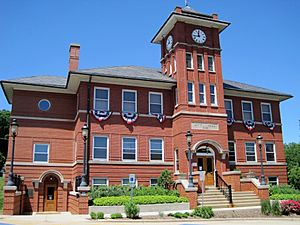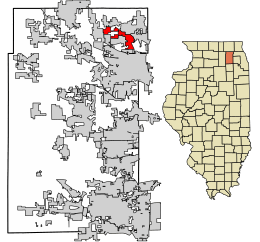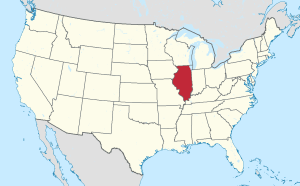West Dundee, Illinois facts for kids
Quick facts for kids
West Dundee
|
|||
|---|---|---|---|
| Village of West Dundee | |||

Village Hall
|
|||
|
|||
| Motto(s):
At the River's Bend
|
|||

Location of West Dundee in Kane County, Illinois.
|
|||

Location of Illinois in the United States
|
|||
| Country | United States | ||
| State | Illinois | ||
| County | Kane | ||
| Township | Dundee | ||
| Government | |||
| • Type | The Village of West Dundee, Kane County, Illinois is a home rule municipality as provided under Article VII, Section 6 of the Constitution of the State of Illinois. | ||
| Area | |||
| • Total | 3.87 sq mi (10.01 km2) | ||
| • Land | 3.75 sq mi (9.71 km2) | ||
| • Water | 0.12 sq mi (0.30 km2) | ||
| Elevation | 840 ft (260 m) | ||
| Population
(2020)
|
|||
| • Total | 7,686 | ||
| • Density | 2,049.05/sq mi (791.20/km2) | ||
| Time zone | UTC-6 (CST) | ||
| • Summer (DST) | UTC-5 (CDT) | ||
| ZIP Code(s) |
60118
|
||
| Area code(s) | 847 | ||
| FIPS code | 17-80125 | ||
| GNIS feature ID | 2400129 | ||
| Wikimedia Commons | West Dundee, Illinois | ||
West Dundee is a small village in Kane County, Illinois, United States. It's located across the Fox River from East Dundee and Carpentersville. In 2020, about 7,686 people lived there. West Dundee is considered a suburb of Chicago, located to the far northwest of the big city.
Contents
Exploring West Dundee's Location
West Dundee is in the state of Illinois, which is in the United States. It's part of Kane County. The village covers about 3.8 square miles (10 square kilometers). Most of this area is land, but a small part is water, mainly from the Fox River.
How West Dundee's Population Grew
The number of people living in West Dundee has changed a lot over the years. Here's a quick look at how the population has grown since 1880:
| Historical population | |||
|---|---|---|---|
| Census | Pop. | %± | |
| 1880 | 585 | — | |
| 1890 | 873 | 49.2% | |
| 1900 | 1,348 | 54.4% | |
| 1910 | 1,380 | 2.4% | |
| 1920 | 1,587 | 15.0% | |
| 1930 | 1,697 | 6.9% | |
| 1940 | 1,831 | 7.9% | |
| 1950 | 1,948 | 6.4% | |
| 1960 | 2,530 | 29.9% | |
| 1970 | 3,295 | 30.2% | |
| 1980 | 3,551 | 7.8% | |
| 1990 | 3,728 | 5.0% | |
| 2000 | 5,428 | 45.6% | |
| 2010 | 7,331 | 35.1% | |
| 2020 | 7,686 | 4.8% | |
| U.S. Decennial Census 2010 2020 |
|||
A Look at West Dundee's History
Early Days and Naming the Town
West Dundee's story began in 1835. That year, Elder John and Nancy Oatman opened a tavern and a store. These became the first important buildings in the new community. More people moved to the area. In 1837, the settlers held a lottery to decide who would get to name the town. Alexander Gardiner won! He named the town Dundee, after his hometown in Scotland. Today, West Dundee is a sister city with Dundee, Scotland. In 1843, a Scottish man named Allan Pinkerton started a business making barrels here. He later became a very famous detective. The town officially became a village in 1887.
The D. Hill Nursery and Town Growth
For many years, West Dundee couldn't grow much because of its location. The Fox River was on its east side. To the north and west was a huge plant nursery called D. Hill Nursery. William Hill started this nursery in 1855. It was known for its fruit trees and later for evergreens. Some of these evergreens even went to Chicago for the World's Fair in 1893! The nursery grew to be 900 acres big. It even survived the Great Depression by raising cattle. During World War II, many seasonal workers came from Chicago by electric train to work at the nursery. Most of them lived right on the nursery grounds.
Modern Development and the Spring Hill Mall
In the 1950s, the D. Hill Nursery started selling off some of its land. A part of it became the Highlands neighborhood, which joined West Dundee in 1956. More land was added to the village in the following years. Eventually, the nursery sold all its land and moved to McHenry County.
A big change happened when plans for the Spring Hill Mall began in 1973. This mall was built on land that used to be part of the nursery. It opened in 1980. The mall was huge, about 1.1 million square feet! It brought a lot of new shops and jobs to West Dundee. By 1982, it had created about 1,600 jobs. New neighborhoods were also built west of the mall.
Even with all this growth, West Dundee has kept its charming, small-town feel. Many historic places are found in the downtown area and nearby neighborhoods. Some old buildings are even said to have been safe places for people escaping slavery on the Underground Railroad. Parts of downtown West Dundee are now listed on the National Register of Historic Places as part of the Dundee Township Historic District.
Getting Around West Dundee
Pace is a bus service that helps people travel in and around West Dundee. You can take Route 550, 552, or 803 to get to places like Crystal Lake, Elgin, and other nearby towns.
Famous People from West Dundee
- Brogan Rafferty is a professional ice hockey player who lived in West Dundee.
See also
 In Spanish: West Dundee (Illinois) para niños
In Spanish: West Dundee (Illinois) para niños


